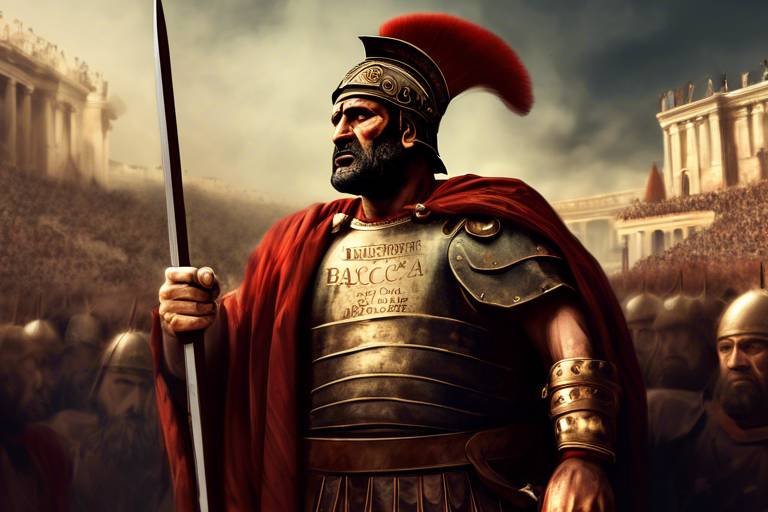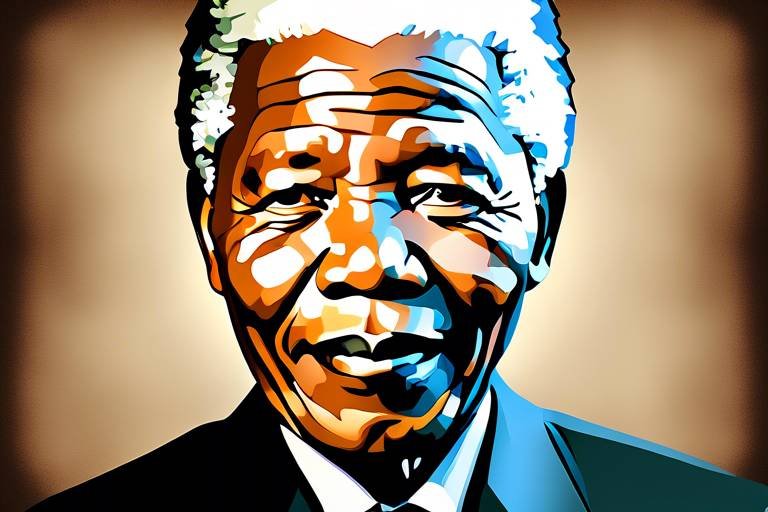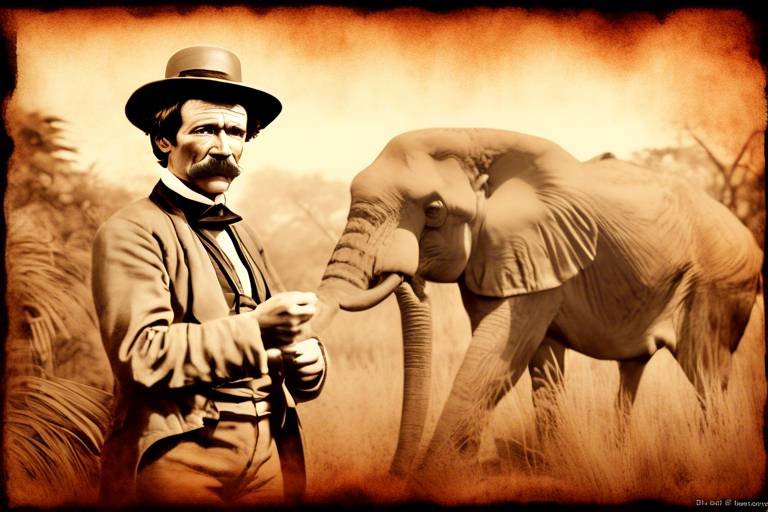Grant: The General Who Won the Civil War
Ulysses S. Grant, often hailed as the general who secured victory in the American Civil War, stands as a towering figure in the annals of history. His strategic brilliance and unwavering leadership played a pivotal role in shaping the outcome of the conflict that divided a nation. Grant's journey from humble beginnings to the commanding heights of military success is a testament to his indomitable spirit and tactical acumen.
From his early life marked by financial struggles to his eventual rise as a seasoned military leader, Grant's story is one of resilience and determination. His military career, punctuated by victories and setbacks, culminated in decisive moments that would alter the course of the war. Battles such as Vicksburg and Chattanooga showcased Grant's strategic genius and his ability to outmaneuver his adversaries.
Grant's legacy extends beyond the battlefield, encompassing his tenure as the 18th President of the United States. His efforts towards Reconstruction and commitment to national unity left an indelible mark on American history. As a leader, Grant embodied qualities of steadfastness, courage, and a deep sense of duty towards his country and his fellow soldiers.
However, Grant's journey was not without personal challenges. Struggling with alcoholism and facing criticism from various quarters, he weathered storms both on and off the battlefield. His triumph over these adversities only served to enhance his reputation as a leader of exceptional fortitude and character.
Grant's historical significance continues to be a subject of debate and analysis. The varying interpretations of his leadership style, military strategies, and legacy in the context of the Civil War offer a rich tapestry of perspectives that shape our understanding of this iconic figure. Grant's enduring impact on American history resonates to this day, underscoring his status as a true hero of his time.

Early Life and Military Career
Ulysses S. Grant, born Hiram Ulysses Grant on April 27, 1822, in Point Pleasant, Ohio, had a modest upbringing. He attended the United States Military Academy at West Point, where a clerical error changed his name to Ulysses S. Grant. Despite not initially aspiring to a military career, Grant excelled in horsemanship and graduated in 1843 as a brevet second lieutenant.
Grant's early military career was marked by his service in the Mexican-American War, where he demonstrated his bravery and leadership abilities. His experiences in the war honed his tactical skills and strategic thinking, laying the foundation for his future success in the Civil War.
After the Mexican-American War, Grant faced personal challenges and setbacks, including resigning from the military due to accusations of drunkenness. However, he persevered and found success in civilian life before the outbreak of the Civil War reignited his military ambitions.
When the Civil War erupted in 1861, Grant reentered the military as a colonel in the Union Army. His early victories at Fort Donelson and Shiloh showcased his aggressive approach to warfare and ability to command troops effectively under pressure.
Grant's rise through the ranks was swift, culminating in his appointment as the commanding general of the Union Army in 1864. His relentless pursuit of the Confederate forces and his willingness to engage in decisive battles earned him the nickname "Unconditional Surrender" Grant.
Throughout his early life and military career, Grant's determination, adaptability, and strategic acumen set him apart as a formidable leader on the battlefield, laying the groundwork for his future triumphs in the Civil War.

Victories and Setbacks
During the American Civil War, Ulysses S. Grant experienced a series of significant victories and setbacks that defined his reputation as a military leader. One of his most notable victories was the Siege of Vicksburg in 1863, where Grant's strategic brilliance and tenacity led to the surrender of the Confederate forces, giving the Union control of the Mississippi River. This victory not only split the Confederacy in two but also showcased Grant's ability to adapt his tactics to achieve success on the battlefield.
However, Grant also faced setbacks during his military campaigns, such as the Battle of Cold Harbor in 1864, where his aggressive assault resulted in heavy casualties for the Union army. Despite this defeat, Grant demonstrated his resilience and determination by quickly regrouping and continuing his relentless pursuit of the Confederacy. His ability to learn from his mistakes and adapt his strategies in the face of adversity set him apart as a formidable military leader.
Grant's leadership during the Battle of Chattanooga in 1863 further highlighted his strategic acumen, as he orchestrated a series of successful maneuvers that ultimately led to the Union victory. By securing control of key railroad lines and supply routes, Grant effectively outmaneuvered the Confederate forces, solidifying his reputation as a masterful tactician.
Throughout the Civil War, Grant faced numerous challenges, including political pressures and internal dissent within the Union ranks. Despite these obstacles, he remained steadfast in his commitment to preserving the Union and ultimately emerged victorious. Grant's ability to overcome setbacks and capitalize on his victories played a crucial role in shaping the outcome of the war and solidifying his legacy as the general who won the Civil War.

Strategic Brilliance
Ulysses S. Grant's strategic brilliance on the battlefield was like a master chess player, always several moves ahead of his opponents. His innovative tactics revolutionized the way wars were fought, earning him the title of the "Butcher" for his relentless pursuit of victory. Grant's ability to adapt quickly to changing circumstances and think on his feet set him apart from other generals of his time. One of his most famous strategies was the concept of total war, where he targeted not only the enemy's armies but also their resources and infrastructure, crippling their ability to fight back. This approach ultimately proved decisive in securing Union victories in key battles like Vicksburg and Chattanooga.

Personal Challenges and Triumphs
Grant's life was not without personal challenges, as he struggled with alcoholism throughout his military career. This battle with alcohol threatened to derail his success on the battlefield, but Grant's determination and resilience ultimately triumphed. Overcoming his personal demons, Grant was able to lead his troops with clarity and focus, earning him the reputation as a steadfast and unwavering leader.

Presidency and Legacy
As we delve into Ulysses S. Grant's presidency and legacy, we uncover a new chapter in the life of this remarkable figure. Following his military triumphs in the Civil War, Grant assumed the highest office in the land, becoming the 18th President of the United States. His presidency was marked by efforts towards Reconstruction, aiming to heal the wounds of the nation and rebuild a united country.
Grant's legacy extends far beyond his military victories, as he implemented policies to protect the rights of newly freed slaves and combat the rise of the Ku Klux Klan. His commitment to equality and justice resonated throughout his presidency, leaving a lasting impact on American history.
Despite facing challenges and criticism during his time in office, Grant's determination and leadership shone through, guiding the nation through a period of tumultuous change. His steadfast resolve and unwavering dedication to the principles of freedom and unity solidified his place in history as a transformative leader.

Grant's Leadership Style
Grant's leadership style during the Civil War was characterized by determination, resilience, and unwavering commitment to his soldiers. He possessed a unique ability to inspire loyalty and confidence among his troops, earning him the nickname "Unconditional Surrender" Grant. Grant's leadership was marked by his hands-on approach to command, often being found at the front lines alongside his men, leading by example rather than issuing orders from a distance.
One of the key aspects of Grant's leadership was his strategic vision and ability to adapt to changing circumstances on the battlefield. He was known for his bold and decisive decision-making, often taking calculated risks that paid off in crucial moments of the war. Grant's willingness to take the initiative and press forward, even in the face of setbacks, set him apart as a leader who was willing to do whatever it took to achieve victory.
Grant's leadership style also emphasized unity and cohesion among his troops. He believed in the importance of teamwork and cooperation, fostering a sense of camaraderie and mutual support within the Union army. Grant's inclusive approach to leadership ensured that all soldiers felt valued and appreciated, creating a strong sense of morale and esprit de corps that bolstered the Union forces during challenging times.
Furthermore, Grant's communication skills were instrumental in maintaining morale and motivation among his troops. He was known for his straightforward and honest communication style, always keeping his soldiers informed about the objectives and challenges they faced. Grant's ability to inspire trust and confidence through his words and actions helped to forge a strong bond between himself and his men, fostering a sense of loyalty and dedication that was essential to the Union's success.

Historical Perspectives
When examining the historical perspectives on Ulysses S. Grant, it becomes evident that opinions vary widely regarding his legacy and contributions to the Civil War. Some view Grant as a brilliant military strategist, attributing the Union's victory to his innovative tactics and unwavering determination. On the other hand, critics point to his high casualty rates and controversial decisions during the war, raising questions about his leadership style and decision-making process.
One key aspect of Grant's historical legacy is his presidency and the Reconstruction era that followed the Civil War. As the 18th President of the United States, Grant faced numerous challenges in navigating the complexities of post-war politics and race relations. His efforts to promote civil rights and protect the newly freed slaves left a lasting impact on American history, shaping the course of the nation's future.
Furthermore, historians continue to debate the significance of Grant's personal struggles, particularly his battle with alcoholism. Some argue that his ability to overcome these challenges and rise to prominence as a military leader exemplifies his resilience and strength of character. Others view his struggles as a potential weakness that may have influenced his decision-making during the war.
Overall, the historical perspectives on Ulysses S. Grant reflect the complexity of his character and the enduring impact of his contributions to the American Civil War and Reconstruction era. By examining the various viewpoints and interpretations of Grant's legacy, we gain a deeper understanding of the man behind the general who won the Civil War.
Frequently Asked Questions
- Who was Ulysses S. Grant?
Ulysses S. Grant, born Hiram Ulysses Grant, was a prominent military leader and the 18th President of the United States. He is best known for his role as the Commanding General of the Union Army during the American Civil War.
- What were some of Grant's notable military achievements?
Grant achieved significant victories during the Civil War, including the capture of Vicksburg and the successful siege of Petersburg. His strategic brilliance and relentless pursuit of the Confederate forces were key to the Union's ultimate triumph.
- How did Grant's personal struggles impact his military career?
Grant battled alcoholism throughout his life, which at times affected his performance on the battlefield. However, he was able to overcome these challenges and maintain his focus on leading the Union forces to victory.
- What was Grant's legacy as President?
As President, Grant focused on Reconstruction efforts to heal the nation after the Civil War. He also championed civil rights and fought against corruption, leaving a lasting impact on American history.
- How is Grant remembered in historical perspectives?
Grant's legacy has been subject to varying interpretations over time. While some view him as a hero who preserved the Union and advanced civil rights, others criticize his administration for corruption. Overall, Grant remains a complex and influential figure in American history.



















